

At the time of writing, playing the Great Ace Attorney Chronicles cannot be used to accrue professional development points for barristers. Looking to the future however, it offers insights into how such a game might one day be a useful training tool for developing trial advocacy skills or preparing witnesses to give evidence in court.
A game might effectively convey to potential witnesses how a case can be lost by telling a lie, or that their credit score may be negatively affected by avoiding questions under cross-examination. It could improve upon the current practice of counsel delivering a well-rehearsed speech in chambers about the importance of telling the truth, of carefully listening to each question and only answering the question asked, etcetera, then watching in dismay from the Bar table as that advice is plainly ignored or totally forgotten in the witness box.
And it may not be as fanciful as it first sounds, given the trend in judicial appreciation of video games, which increased by one upon the swearing-in to the Federal Court of Australia of Justice Nye Perram. At his Honour’s swearing-in ceremony, speaking on behalf of the Australian Bar Association, Anna Katzmann SC observed that his Honour ‘was the first judicial officer, federal or state, known to have a Sony Play Station’ and ‘Grand Theft Auto is reputed to be your Honour’s favourite video game’.
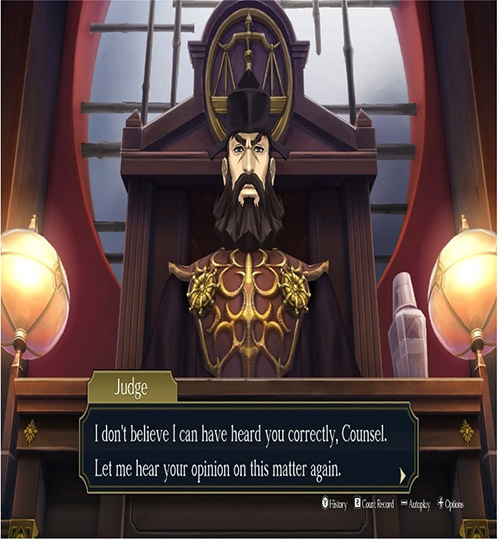
The Great Ace Attorney Chronicles transports virtual advocacy to another realm. Set alternately in Meiji-era Japan and Victorian London, you play the role of Ryunosuke Narahudo, a student at Yumei University. In the first act, he reluctantly represents himself as the accused in a murder trial. His McKenzie friend is Kazuma Asogi, a law student whose talent is so stellar that he has qualified to practise without even having graduated.
With uncanny verisimilitude, the opponent is a seasoned advocate who shakes Ryunosuke’s already teetering confidence with perfectly timed quips and technical objections made during cross-examination. Comebacks from the courageous Kazuma help to restore his backbone.
In the second act, Kazuma is a passenger on board a ship that is steaming for Britain where he is to take up a scholarship and continue his law studies. Ryunosuke is a stow-away in his cabin. Kazuma’s sudden and shocking death initiates a detective story that Ryonosuke must solve, assisted by the percipient, Herlock Sholmes.
In the third act, upon arrival in England, Ryunosuke makes his introductions with Lord Chief Justice Mael Stronghart. The name, like that of a Dickens character, is obviously intended to convey a satirical message.
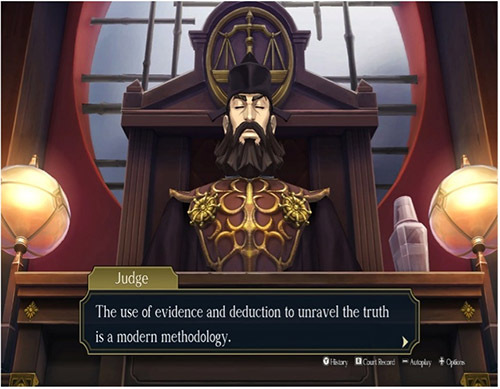
Ryunosuke’s first advocacy task is to persuade the chief justice to permit him to study law in Kazuma’s place and qualify as a barrister in London. Otherwise, without a student visa he will be returned to Japan on the first available ship.
Rather oddly, the chief justice is persuaded to allow it, on condition that Ryunosuke successfully defends a man charged with murder whose trial starts that very day. For mysterious reasons (those unrelated to money), the accused is unable to retain experienced counsel to act for him.
Throughout the course of the trial there is a sense of achievement whenever the correct forensic decision is made, in selecting evidence to tender which is relevant to your case, or in pressing witnesses on inconsistencies in their testimony.
On a critical note, the sheer quantity of narration can sometimes detract from the thrill of the chase. Whenever an incorrect forensic decision is made a strike is recorded against you and the preceding scene repeats, giving you another chance at presenting relevant evidence or asking a crucial question in cross-examination of a witness. However, such repetition can seem like unnecessary delay. Also, the absence of an option to view the entire scene’s dialogue at a single glance drags out the play, sentence by sentence. Selecting auto-play robs you of any interactive gaming features.

Gamers familiar with Ace Attorney Adventures would no doubt find this to be a delightful addition to the series produced by Capcom. Murder mystery lovers who are avid gamers would also find satisfaction in unravelling all the clues that point to the cause of Kazuma’s death. But casual gamers are likely to struggle with the level of commitment required to finish.
And non-gamers interested only in developing advocacy skills need not apply.
Reviewed by Sean O’Brien
The Ace Attorney Game Series
By Capcom Co.
In 2001 Capcom released the Ace Attorney series on Game Boy Advance in Japan. The series proved to be popular enough to be ported onto the Nintendo DS. Ported onto iOS in 2013, the game allowed for a whole new group of gamers to play on their portable devices (including me).
The game is broken up into a series of episodes (the first three of which are free to download on iOS). The introduction to every episode shows snippets of the crime you’ll be solving. You progress through the story by speaking to witnesses and investigators, searching for clues and evidence and culmination is in a trial running for a few days in court before a single judge.
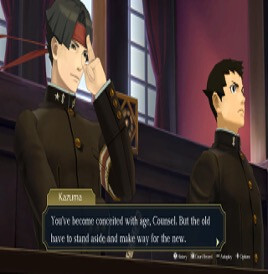
During the trial phase you will be required to ‘press’ witnesses you suspect of holding back, and to present evidence and clues you’ve gathered in order to find holes and expose the lies in their testimony. Be warned though, presenting the wrong evidence to the wrong witness (or even at the wrong time) can result in a ‘penalty’ as well as some mild judicial bullying.
The game is essentially text-based requiring you only to tap little arrows to advance dialogue. When investigating different scenes, you drag around a little target that will turn red once you hover over something that can be checked.
For me the best part was the characters. Many may already be familiar with the main protagonist of the original series, Phoenix Wright, having been sent iterations of memes by waggish friends: Maya Fey (occasional co-counsel, occasional client), with the ability to channel spirits who provide useful clues and Apollo Justice (protégé who receives a series of his own, when Phoenix Wright becomes disbarred and accused of murder) has the ability to detect when witnesses are withholding evidence through the use of his magical bangle.
The climax of every episode is the trial where you face the main antagonist: that being the prosecutor, usually the very snappily-dressed Miles Edgeworth.
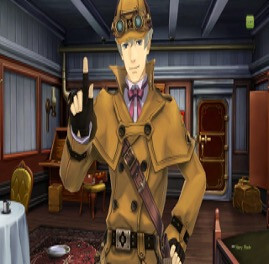
My personal favourite is the ferocious yet perpetually surprised judge, whose behaviour, I’m sure, has no basis in reality.
As you progress through the game you will be introduced to a number of other characters, including, but not limited to: Maya Fey (occasional co-counsel, occasional client), with the ability to channel spirits who provide useful clues and Apollo Justice (protégé who receives a series of his own, when Phoenix Wright becomes disbarred and accused of murder) has the ability to detect when witnesses are withholding evidence through the use of his magical bangle.
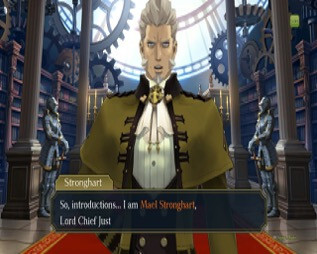
The Ace Attorney series is fun, silly and most importantly the first three episodes are free on the Apple app store. I recommend trying it, at least in order to look knowledgable in front of your meme-circulating friends.
Reviewed by Kavita Balendra
